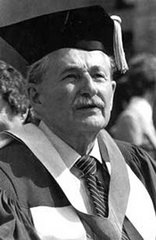Without hyperbole and undue fanfare, Harper's plan for rebalancing federalism is quite simply one of the most artful and historic in the evolution of federal provincial relations. It is bound to get lost in talk about the rest of the budget, and it is overshadowed by major constitutional negotiations like Meech Lake or Charlottetown, but the 2007 Budget is deserving of the highest accolades, nonetheless.
Harper took on a seemingly insurmountable challenge: After years of Liberal cut-backs to the provinces, he pledged to pull together a deal on equalization and transfer payments, in the face of several conflicting election promises, 10 conflicting premiers, a Quebec election, a minority government situation, and hundreds of bureaucratic, political and academic skeptics. This is no small task. Harper should be commended for promising to do so, applauded for attempting, and idolized for accomplishing it.
Sure, it's a work in progress, but his attack on the fiscal imbalance is enough to impress anyone with even a cursory knowledge of fed-prov relations (not to mention Gilles Duceppe and Ed Stelmach). Today's Globe article spells out the deal:
First, provinces will be able to choose between the old system and the new system. Nova Scotia and Newfoundland and Labrador are expected to stick with the old system for a while, since their offshore accords under the old regime more than surpass the enrichments of the new regime.
Once a province has joined the new system, it can't go back to the old system. But it can choose whether it wants to calculate what it is owed based on including half of its natural-resource revenue, or based on excluding all of its resource revenues.
That choice allows for resource-rich provinces to keep their royalties and receive equalization payments at the same time, eliminating the "claw-back" that has long annoyed poorer provinces trying to improve their lot.
However, there's a cap on how much money receiving provinces can get, so that resource-rich provinces such as Newfoundland will not end up receiving transfer payments that make them richer than have-provinces such as Ontario.
Several provinces, notably Newfoundland and Saskatchewan, argued strongly against a cap, but its inclusion was crucial for Ontario and Alberta, who see it as the only way the new regime would be fair to provinces that don't receive equalization.
The premiers of both Newfoundland and Saskatchewan were quick to harshly condemn the Harper government for the cap, calling it a "betrayal" of an election promise that hampers the ability of both provinces to prosper.
But the fiscal balance package doesn't stop there. Transfers for education are being increased by about $800-million a year, distributed on a per capita basis that favours populous provinces such as Ontario. And the Canada Social Transfer -- the main funding vehicle that Ottawa uses to help provinces pay for social programs -- will rise by 3 per cent a year starting in 2009.
Both the CST and the Canada Health Transfer will be restructured so that they are on a strict per capita basis, removing all traces of equalization from those transfers that have rankled Ontario and Alberta in the past. However, there are some strings attached. The health transfers will not be restructured until the current agreement expires seven years from now. Plus, CST will now be split into an education category and a social assistance category, in an effort to suggest to provinces where they should spend the money.
But the government has imposed a floor on the transfers, so that no province will actually lose money compared with current funding levels, even after equalization factors have been sifted out. Ontario will gain about $350-million a year from the CST changes, while Alberta will see about $310-million in increased annual transfers.
What does all of this mean? Provinces now have a choice as to which equalization formula best suits their needs: (1) the old formula; (2) the new formula with 50% of resource revenue included; (3) the new formula with no resource revenue included, but with a cap. On top of it all, they all receive an increase in per capita transfers. Quite simply, there is not a single province who emerges from this deal worse off. (If they do, it is by choice.)
Don't be fooled by Premiers Calvert and Williams. The former is facing an uphill battle against the SaskParty in an upcoming election and needs to show some anti-conservatism in order to shore up his base; the latter is known for howling at any moon that rises over Ottawa. They're both better off than before the deal, and Harper most certainly did not break his election promise to keep resource revenues out of equalization (if they choose to do so, all premiers have this option). Long story short, anyone who thought SK and NL would remain "uncapped" (i.e., receive equalization payments to the point where their per capita income is greater than Ontario) was living a pipe dream. The objections of Calvert and Williams -- much like that of Layton and Dion -- smack of crass partisanship, idealism, and knee-jerk diplomacy.
Granted, this is a one-off, seven-year deal. It is not as permanent as the premiers would have liked (e.g., indexing the transfers to GST revenue, or vacating tax room). This is the one down-side, but one grounded in the reality that economies and politics change a lot in a decade.
In the end, however, Harper's masterful rebalancing act was not only the best deal possible, it was even better than any imaginable just months ago. Kudos to him.




